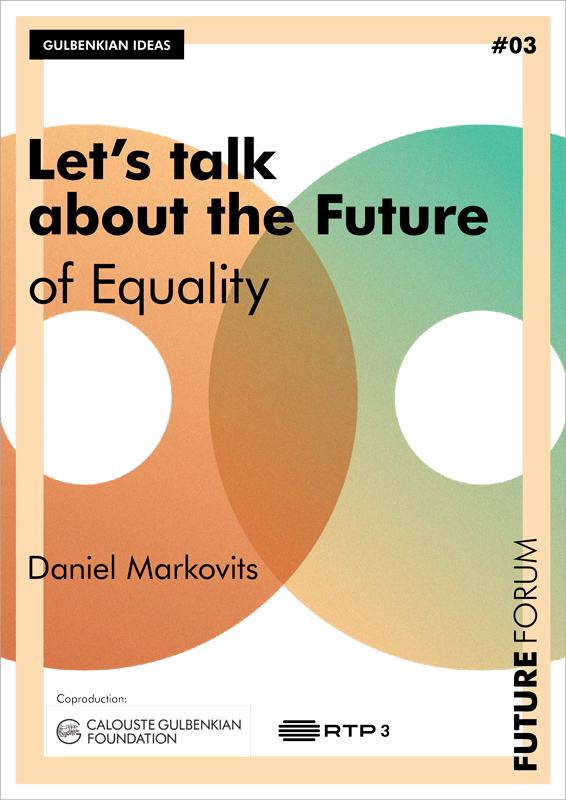
Let’s Talk about the Future of Equality
Daniel Markovits
Moderated by Miguel Poiares Maduro, president of the Scientific Committee of the Gulbenkian Future Forum, the conference Let’s Talk About the Future of Equality has the participation of Daniel Markovitz (Yale University) and Philippe van Parijs (Louvain University).
The opinion upheld by both authors in this Talk can be seen in the Gulbenkian Idea each of them prepared for this purpose.
This is the second Conference of the “Let’s Talk About the Future” cycle, held in partnership with RTP3, in which internationally recognized speakers debate key themes of our near future.
Daniel Markovits is Guido Calabresi Professor of Law at Yale Law School and Founding Director of the Center for the Study of Private Law. Markovits publishes widely and in a range of disciplines, including contract law, legal theory, moral and political philosophy, and behavioral economics. His writings have appeared in Science, The American Economic Review, and The Yale Law Journal. His current book, The Meritocracy Trap (Penguin Press, 2019), develops a sustained attack on American meritocracy. The meritocratic ideal – that people should get ahead based on their own accomplishments rather than their parents’ social class – has become our age’s literal common sense. Markovits argues, however, that both up and down the social ladder, meritocracy is a sham. Today, meritocracy has become exactly what it was invented to defeat – a new aristocracy, only now based on schooling rather than breeding. Upward mobility has become a fantasy, and the embattled middle class is more likely to sink into the working poor than to rise into the professional elite. At the same time, meritocracy ensnares even those who manage to claw their way to the top, trapping rich adults in a pitiless competition, which requires them to work with crushing intensity, exploiting their expensive educations in order to extract a return.
Philippe Van Parijs holds doctorates in philosophy (Oxford) and the social sciences (Louvain). He is aguest professor at the Universities of Louvain and Leuven. He was the founding director of Louvain’s Hoover Chair of Economic and Social Ethics from 1991 to 2016, and a regular visiting professor at Harvard University from 2004 to 2008 and at the University of Oxford from 2011 to 2015. He is a member of Belgium’s Royal Academy of Sciences, a Fellow of the British Academy and doctor honoris causa of Laval University (Québec). He was awarded the Francqui Prize in 2001 and the Ark Prize for Free Speech in 2011. In July 2020, the British magazine Prospect selected him, as «the godfather of the basic income movement», among «the world’s top ten thinkers for the Covid-19 age». He chairs the Advisory Board of the Basic Income Earth Network, which he co-founded in 1986, and the Brussels Council for Multilingualism, set up by the government of the Region of Brussels-Capital in 2020. He coordinates with economist Paul De Grauwe, the Re-Bel initiative (“Rethinking Belgium’s institutions in the European context”), which he co-founded in 2009. An opinion piece he published in May 2012 under the title «Picnic the Streets» triggered the civil disobedience movement that led to the pedestrianization of Brussels’ central lanes. His books include Evolutionary Explanation in the Social Sciences (Rowman & Littlefield, 1981), Le Modèle économique et ses rivaux (Droz, 1990), Qu’est-ce qu’une société juste? (Seuil, 1991), Marxism Recycled (Cambridge U.P., 1993), Real Freedom for All (Oxford U.P. 1995), What’s Wrong with a Free Lunch? (Beacon Press, 2001), Just Democracy. The Rawls-Machiavelli Programme (ECPR 2011), Linguistic Justice for Europe and for the World (Oxford U.P. 2011), After the Storm. How to Save Democracy in Europe (Lannoo 2015, ed. with L. van Middelaar), Basic Income. A radical proposal for a free society and a sane economy (Harvard U.P. 2017, with Y. Vanderborght) and Belgium. Une utopie pour notre temps/Belgium. Een utopie voor onze tijd (Académie royale de Belgique/Polis, 2018).
